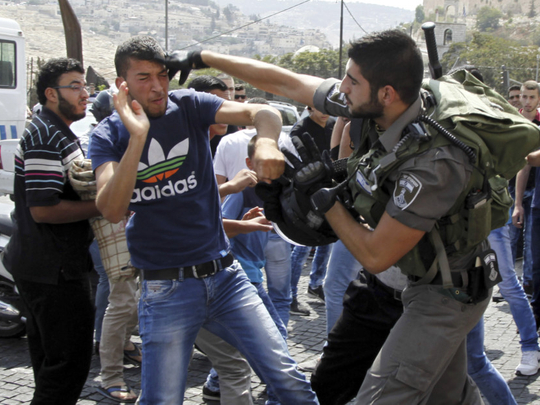
For the second time in two months, the decades-long Palestinian-Israeli conflict has been neglected by key international leaders since the United Nations General Assembly (UNGA) met last month in New York, and Pope Francis visited the United States for the first time.
Neither US President Barack Obama, Russian President Vladimir Putin — who are now deeply involved in the four-year-old turmoil in Syria — nor the Pope uttered a word about the ongoing conflict in the Holy Land, which this week seemed to be on the threshold of a third Palestinian Intifada, or uprising.
This shocking silence followed bloody confrontations in occupied East Jerusalem, which the Palestinians hope to establish as their capital. Violence has been an almost daily occurrence in occupied Jerusalem in recent weeks and Muslims are fearful that Israel is attempting to alter the status quo of the towering Muslim holy site of Al Haram Al Sharif, where Al Aqsa Mosque is located.
The Palestinian Red Crescent reported that 456 Palestinians had been wounded last week in various confrontations with Israeli security forces. The Palestinian medical organisation added that 36 of the wounded suffered injuries from live ammunition, while 136 were hit by rubber bullets. Many others were hurt from inhaling tear gas.
The Israeli Prime Minister, Benjamin Netanyahu, who had just addressed the opening session of the UNGA, vowed on his return home to launch a “harsh offensive” to counter the rising violence described as “lone wolf” attacks against Israelis.
The Palestinians in the occupied West Bank, which Israel conquered in 1967, would be temporarily barred from occupied Jerusalem, where some 300,000 Palestinians already live — a third of the city’s population. He also announced that the new measures would include speeding up the razing of homes of Palestinian attackers and banning those who incite violence from the city.
Systematic violation
The bloodshed, which included a drive-by shooting that killed an Israeli couple in the West Bank and an arson attack that killed a Palestinian toddler and his parents in July, has triggered concerns of wider escalation.
Israel’s bestselling newspaper, Yedioth Ahronoth, published a front-page headline that read ‘The Third Intifada’, though the violence has not reached the levels of past Palestinian uprisings.
When Palestinian President Mahmoud Abbas addressed the UNGA last week, he dropped a “bombshell” — that the Palestinians cannot continue to be bound by the 20-year-old Oslo Accords and their accompanying security and economic agreements with Israel.
He also accused Israel of systematic violation of the Oslo Accords and a stubborn attempt to finally do away with the two-state solution.
The options that the Palestinians have are limited even if Abbas reportedly told the Palestine Liberation Organisation’s Executive Committee last Tuesday that he wanted a political solution “using peaceful means and nothing else”. His only condition was that Israel fulfil its promise to release the last group of Palestinian detainees who were jailed before the Oslo Accords and to stop illegal colony expansion into Palestinian Territories.
George S. Hishmeh is a Washington-based columnist. He is a former editor-in-chief of the Daily Star.









